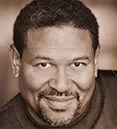From the late August Wilson, one of America’s greatest playwrights and creator of award-winning titles like Fences and Jitney, comes this autobiographical tour de force. In his one-man show, Wilson takes us on a journey through his days as a young poet: his first few jobs, a stint in jail, the support of his lifelong friends, and his encounters with racism, music, and love as a struggling writer in Pittsburgh’s Hill District. Originally performed by Wilson himself, How I Learned What I Learned is a heartfelt theatrical memoir—charting one man’s journey of self-discovery through adversity, and what it means to be a black artist in America.
In partnership with Lorraine Hansberry Theatre and Ubuntu Theater Project
MTC is offering free admission for furloughed employees and contractors during the partial government shutdown. Federal employees are asked to provide their CAC or federal identification card when purchasing tickets at the MTC Box Office window or when picking up tickets at Will Call that have been purchased over the phone. No code required. In-person / phone sales only.
Generous support for August Wilson's How I Learned What I Learned provided by The Shubert Foundation, William & Flora Hewlett Foundation, Koret Foundation and Kenneth Rainin Foundation.
MTC provides advisories for each production regarding special effects that may affect patron health and physical sensitivities as necessary, and there are no advisories for How I Learned What I Learned. MTC does not provide advisories relating to content, because content sensitivities vary from patron to patron. If you have questions about content, please contact the box office prior to purchasing your tickets as we do not offer refunds to patrons who choose not to see a show based on subject matter.












An intimate evening with the late August Wilson at MTC
It’s not at all rare to see one of August Wilson’s plays produced in the Bay Area. The late playwright’s 10-play American Century Cycle — each set in a different decade of the 20th century, almost all in the same African American neighborhood in Pittsburgh — have quickly become beloved classics of American drama. It is rare, however, to see a Wilson play produced that’s not part of that cycle.
“How I Learned What I Learned,” making its Bay Area premiere at Marin Theatre Company, is an autobiographical one-man show originally performed by Wilson himself in 2003. A coproduction with San Francisco’s Lorraine Hansberry Theatre and the East Bay’s Ubuntu Theater Project, the show will move to SF’s Buriel Clay Theater in February and Oakland in March.
This coproduction stars Steven Anthony Jones, a longtime American Conservatory Theater company member who then served for several years as the Lorraine Hansberry’s artistic director. It’s directed by Margo Hall, who has performed in all of the previous Wilson plays produced at MTC: “Seven Guitars,” “Gem of the Ocean” and alongside Jones in “Fences.” Hall has also previously directed Jones in LHT’s production of the solo show “Thurgood.”
August Wilson (Steven Anthony Jones) stars in the Bay Area premiere of “How I Learned What I Learned” at the Marin Theatre Company in Mill Valley.“How I Learned What I Learned” is a delightful account of Wilson’s early years as a young man growing up in Pittsburgh’s Hill District in a string of anecdotes, arranged more as a string of association than chronologically. Often there’s an obvious moral or lesson learned, sometimes there isn’t, but they’re always wonderfully entertaining and enthrallingly told, and often tremendously funny. The show lasts about an hour and 50 minutes without intermission, and doesn’t feel long in the slightest.
Jones occasionally got stuck on his lines on opening night, breaking up the pacing a little bit, but he proves a compelling raconteur as Wilson, with a forceful personality and wry humor. There’s something marvelously inviting about the way he relates the story that makes it feel personal and intimate even on the large stage. (And the performance spaces will get smaller as the show moves from city to city.)
The terrific set by Edward E. Haynes Jr. consists of many sheets of paper of various sizes, hung on lines as if they were laundry or developing photos. There’s a simple desk with a mammoth dictionary atop it, and at the sides of the stage are two small stretches of low, torn-up chain-link fence with a few tufts of tall grass. Chapter (or topic) titles are projected onto the hanging papers (projection design by Mike Post), accompanied by the clicking of a typewriter in Everett Elton Bradman’s sound design.
Almost none of the stories Wilson tells in the show are about writing. I don’t think he even mentions plays aside from a Christmas pageant he performed in as a kid. But alongside such valuable life lessons as not telling anybody where to find somebody else unless you know why they’re looking for them, there are certainly explicit moments of inspiration and aspiration where he talks generally about what he set out to accomplish as an artist. A line about intending to continue to write into his 90s is particularly bittersweet because Wilson died of liver cancer at 60, just two years after premiering this piece.
If there’s one ongoing theme aside from the one made explicit in the title, it’s Wilson’s uncompromising self-respect, which leads him to quit several jobs almost as soon as he starts them when he’s treated as suspect simply for being a young black man. This recurring refrain of never settling for less than you deserve, that “something is not always better than nothing,” might be one of the most valuable lessons one could learn from “How I Learned What I Learned.”
August Wilson from epic to portrait in Marin Theatre’s ‘How I Learned What I Learned’
In the hands of other playwrights and actors, “How I Learned What I Learned” might sound like a lot of “… and another thing.”
August Wilson’s autobiographical one-man show doesn’t build toward a single climax. As the narrator recounts his formative experiences in Pittsburgh’s Hill District — the site of many of the works in Wilson’s extraordinary 10-play Century Cycle — there isn’t one grand revelation or a rising and falling narrative line. Scenes weave in and out of gunpoint (the double barrels of a hunting rifle are “hubcaps” when they’re pointed at you), in and out of his mother’s house as first attempts at adulthood founder, meandering toward ownership of his identity as a writer and artist who’s just as aware of his flaws as he is of the principles he will never bend.
In Seattle in 2003, the Pultizer Prize- and Tony-winning playwright performed the show himself, just two years years before he died. Now, veteran local actor Steven Anthony Jones embodies the writer for the show’s Bay Area premiere, which opened Tuesday, Jan. 15, at Marin Theatre Company, before it moves to San Francisco’s Buriel Clay Theater under the auspices of Lorraine Hansberry Theatre, winding up at Berkeley’s Waterfront Playhouse and Conservatory courtesy of Ubuntu Theater Project in March.
The script hopscotches from adamant righteousness to bemused comedy to youthful earnestness — from all the jobs Wilson walked out on, instantly and sans qualm, because of a racist boss; to Wilson’s friend who papers the neighborhood in advertisements for a concert when he can’t even play an instrument; to the seventh-grade crush that led to a botched cymbal crash during the school Christmas pageant.
But in Wilson’s singular voice, as summoned by Jones under the direction of Margo Hall, “How I Learned What I Learned” never feels like a disconnected series of anecdotes. Jones makes each change in subject and shift and tone as natural and inevitable as a law of physics.
On opening night, though, he was still shaky with the text, calling for a line once and seeming to search for them often, especially at the beginning of the show. In a few instances, he hadn’t yet wrestled sense out of Wilson’s loop-the-loop syntax and virtuoso vocabulary: “Years later, I would have to travel through the province of unsettled schoolboys searching for the fleshy comforts of conquest, the wild, exclamatory music of sorority girls in full surrender and secret knowing of riotous muscle.”
But more often, you bask in Jones’ masterful elocution and intonation — the way he relaxes into a vowel; crisps a consonant; divines, for each syllable, a one-of-a-kind way to make it important by singing it, stretching it, clipping it, landing on it with a mighty thud. Jones has an inborn kingliness of manner that he dispenses benevolently to Wilson’s subject matter and his audience alike. “Here,” he seems to say, “there’s room on my regal coattails for all of you to ride on.”
And who but nobility could proffer such wisdom as Wilson? To have your mother die is to learn “that allthem years you been living on your mother’s prayers and now you’ve got to live on your own.” “If you go through life carrying a 10-gallon bucket, you always going to be disappointed. ’Cause it ain’t never going to be filled.”
The great project of Wilson’s Century Cycle was to write black life, history and culture into what had too often been a monochromatic American dramatic canon. In “How I Learned What I Learned,” Wilson paints a portrait that’s just as wide and deep, but of a single man — one who demands, and earns — respect with each utterance, who can build a world with a turn of phrase, who can bring the same eloquent, compassionate honesty he brought to Pittsburgh’s Hill District to himself.